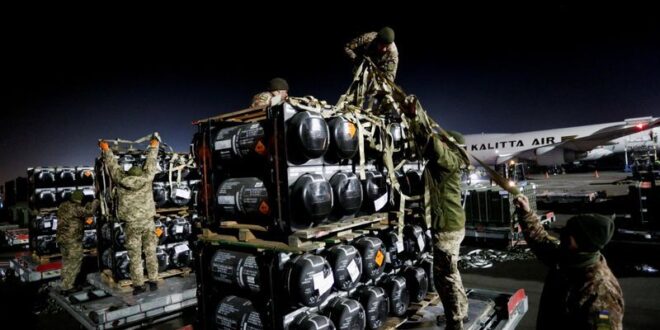WASHINGTON (Reuters) – U.S. President Joe Biden’s administration is engaged in urgent discussions with Congress to allow it to use up $6 billion in military aid for Ukraine before a Sept. 30 deadline, according to multiple sources familiar with the matter.
The effort comes at a high-risk moment for Ukrainian forces, who are advancing into Russia’s Kursk region while trying to hold off Russian forces threatening the eastern Ukrainian city of Pokrovsk.
The Presidential Drawdown Authority (PDA), a key component of a $61 billion aid package for Ukraine passed in April, allows the president to transfer defense articles and services from U.S. stocks in response to emergencies.
PDA has been the primary mechanism the Biden administration has used to ship weapons to Ukraine. Most recently, the administration announced on Aug. 23 a new military aid package worth $125 million, including air-defense missiles, counter-drone equipment, anti-armor missiles and ammunition.
However, most of the $7.8 billion in PDA in the bill Biden signed into law in April has not been used, leaving officials scrambling to find a way to keep the remaining $6 billion from expiring as the Sept. 30 deadline – the end of the 2024 fiscal year – approaches.
Sources close to the negotiations told Reuters that the State Department hopes to attach an extension of the PDA authorities to a Continuing Resolution, a short-term emergency spending bill that the Senate and House of Representatives must pass this month to avoid a Sept. 30 government shutdown.
Congressional aides, who requested anonymity to discuss ongoing negotiations, insisted there would be a solution, given strong bipartisan support for assisting Ukrainian President Volodymyr Zelenskiy’s government.
Zelenskiy travels to the United States this month and hopes to present a “victory plan” to Biden. He is expected to take part on Friday in a meeting of the Ramstein group of nations, including the U.S., which supplies arms to Ukraine.
U.S. COMPANIES BENEFIT
Congressional aides said it was not fully clear why the flow of weapons to Ukraine had slowed this year, but said it was partly due to U.S. Department of Defense concern that its own stocks were being depleted, as the weapons industry struggles with supply chain issues.
Lawmakers who back Ukraine, from both parties, stressed the importance of continuing the support.
“Bipartisan support for Ukraine is critical to American interests, and we will do whatever we can in 2024 to build on these successes and secure additional future military aid necessary to maintain the momentum,” Democratic Senator Richard Blumenthal and Republican Senator Lindsey Graham, said in a statement last month after their sixth visit to Ukraine.
Congress has approved nearly $175 billion of aid and military assistance for Ukraine and allied nations since Russia launched its full-scale invasion in February 2022.
Much of that has come in the form of long-term funding for U.S. defense production, as the Pentagon looks to replace equipment sent to Kyiv. Biden administration officials and Ukraine supporters in Congress have stressed the benefits for U.S. producers as they look to overcome the resistance from a vocal bloc of Republicans who say taxpayer money should be spent at home, not sent abroad.
Companies like RTX’s Raytheon in Arizona which makes Patriot missile systems and General Dynamics’ 155 millimeter artillery plants in Pennsylvania, are receiving contracts for products that will replace those sent to Ukraine using PDA. Arizona and Pennsylvania are among the “swing” states expected to decide the Nov. 5 U.S. presidential election.
As negotiations with Congress continue, the administration is considering a backup plan, according to sources familiar with the discussions, in which the State Department would make a substantial PDA announcement before the Sept. 30, effectively spending the remaining $6 billion before it expires.
Under this contingency plan, the delivery timeline for the weapons and equipment would be extended, sources said, allowing for a more gradual transfer of resources to Ukraine.
Congressional aides and administration officials also note that there is another resource available: about $3 billion in PDA authority resulting from a Pentagon accounting error remains available to help Ukraine. It does not expire.
(Reporting by Patricia Zengerle and Mike Stone in Washington; Editing by Don Durfee and Alistair Bell)
 BeritaKini.biz Berita Viral Terkini di Malaysia
BeritaKini.biz Berita Viral Terkini di Malaysia





